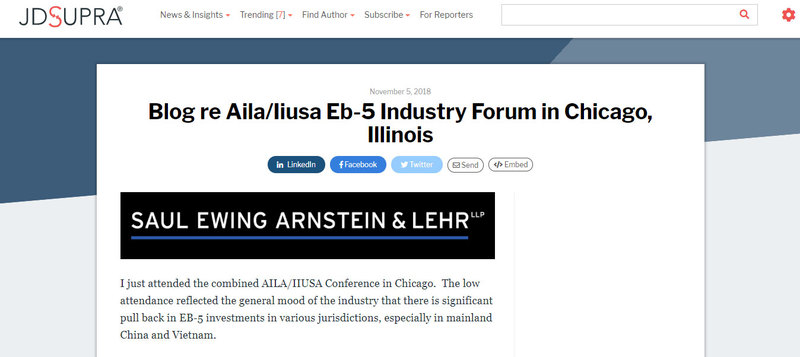I just attended the combined AILA/IIUSA Conference in Chicago. The low attendance reflected the general mood of the industry that there is significant pull back in EB-5 investments in various jurisdictions, especially in mainland China and Vietnam.
During the meeting on Tuesday, October 30th, Charles Oppenheim, Chief, Immigrant Visa Control and Reporting, U.S. Department of State, announced potential visa retrogression. The relevant chart is attached to this Blog. As is noted, it is predicted that India will retrogress next year, for up to 5.7 years. The retrogression in Vietnam has increased to over 7 years, with retrogression in China potentially being up to 14 years. It is noteworthy that these predictions may be conservative given the fact there is an assumption as to the number of visas being issued for each applicant, which assumption may not turn out to be accurate, and there may not be a valuation for investor withdrawals from the Program.
The meeting itself was very well structured and had a lot of substance. My takeaways are as follows:
1. Retrogression update - very negative on the industry and the information provided by Charles Oppenheim reached the market immediately after his speech.
2. There is virtually no activity going on in China with respect to EB-5. It appears that China’s investors are looking for alternatives in other countries and no longer actively seeking migration to the United States given the very lengthy retrogression process.
3. There were various panels emphasizing integrity and transparency in the EB-5 process. EB-5 has shifted from new projects to management of existing projects, including the advent of a multi-billion dollar retrogression reality that will be taking place over the next several years.
4. Investor Activism. Investor activism increased dramatically, especially in China. This is a result of the following:
a. The lengthy retrogression in China whereby many investors now seek a return of their capital and want to in effect withdraw their I-526 visa petitions since they do not want to wait the extended period of time to gain entry into the United States.
b. There is much communication among investors in China through WeChat. Some investors believe they have been misled either by their agents and/or sponsors in connection with the actual investment or the retrogression time period when the investment was made. Of course, the retrogression problem has become far more significant over the past 2 years when the retrogression time period has dramatically increased.
5. Class Action/Private Lawsuits. Certain attorney groups are organizing investors to bring class action lawsuits against the sponsors of regional centers, market agents and/or developers. There has been a hand full of suits that have been maintained in an effort to generally seek a refund of the money invested or to otherwise block redeployment efforts that investors believe are not in their best interest.
6. Redeployment Options. A whole practice area will develop on redeployment options. Many developers are seeking to have loan payment proceeds redeployed in another project with the developer. Some developers/sponsors are enhancing the investor rate of return in order to compensate investors for the extended time delay in receiving back their funds. That is more of a marketing issue rather than a legal issue, but the increased return is helping to reduce the negative effect of the long delay and potentially receiving a return of the investment amount.
One of the key factors of redeployment in effect is laddering of how funds are returned. The concept here is that each investor has their own time period for when he or she can receive a return of the invested funds. Based upon the June 14, 2017 Draft Policy Memorandum, investors no longer have to wait for I 829 adjudications to receive a return of their capital; rather after they satisfy the 2-year Sustainment Period, the investor can now receive a return of capital. It is essential that project sponsors perform a detailed analysis of the investor base as to when each investor will be eligible to receive a return of the capital contribution.
As part of the redeployment process, there is now an emphasis on professional management, retaining experts for evaluating redeployed projects and generally obtaining experts to maintain and manage the EB-5 process.
7. SEC Investigations and Regulations. I was on a panel addressing SEC enforcement actions against broker/dealer violations and against the multiple parties. The classic cases involve Jay Peak, Palm House in Palm Beach County, Florida, the Idaho Gold Mining transaction, the San Francisco Regional Center case and other cases. These cases have had a negative impact on the market and potentially on new legislation.
8. New Legislation. There was some discussion on new legislation, but it seems that nobody had any crystal ball on when the new proposed legislation would be actively promoted given the current issues in Congress and the various priorities that Congress is facing related to other immigration matters being considered.
https://www.jdsupra.com/legalnews/blog-re-aila-iiusa-eb-5-industry-forum-37171/
Mentions
States
- Florida
Videos





Subscribe for News
Site Digest
Join Professionals on EB5Projects.com →
Securities Disclaimer
This website is for informational purposes only and does not constitute an offer or solicitation to sell shares or securities. Any such offer or solicitation will be made only by means of an investment's confidential Offering Memorandum and in accordance with the terms of all applicable securities and other laws. This website does not constitute or form part of, and should not be construed as, any offer for sale or subscription of, or any invitation to offer to buy or subscribe for, any securities, nor should it or any part of it form the basis of, or be relied on in any connection with, any contract or commitment whatsoever. EB5Projects.com LLC and its affiliates expressly disclaim any and all responsibility for any direct or consequential loss or damage of any kind whatsoever arising directly or indirectly from: (i) reliance on any information contained in the website, (ii) any error, omission or inaccuracy in any such information or (iii) any action resulting therefrom.



